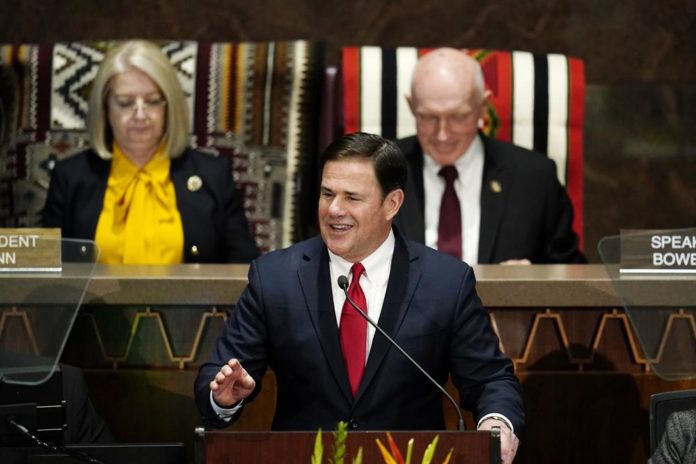
Gov. Doug Ducey on Monday proposed setting aside $1 billion to remove the salt from seawater and bring it to Arizona, a major legacy project as he enters his eighth and final year in office.
The Republican governor previewed the plan but offered few details in his annual state of the state address, delivered to a joint session of the House and Senate.
“Instead of just talking about desalination – the technology that made Israel the world’s water superpower – how about we pave the way to make it actually happen?” Ducey said in his nearly hourlong address.
Ducey enters his final year with the state seeing a big budget surplus, a major turnaround from his first speech to lawmakers in 2015 when he faced a $1 billion deficit. Lawmakers also set aside $200 million last year for future water infrastructure.
The western United States is in the midst of a prolonged drought. Cutbacks in Arizona’s allocation of Colorado River water have already forced some farmers to let their fields go fallow, and more cuts are likely down the road absent a major weather turnaround.
Ducey said he has been working on the plan with House Speaker Rusty Bowers and Senate President Karen Fann, both Republicans. He didn’t say where he’d like to build a desalination plant, but water policy experts have long discussed the possibility of using water from the Sea of Cortez in Mexico, the nearest sea to Arizona.
Some environmentalists opposed desalination because it’s energy-intensive and can be harmful to sea creatures.
Even if lawmakers approve, the project would still be years in the making, but Bowers said Ducey and legislative leaders want to get started while the state has the money available.
“The plan is comprehensive, and it’s broad, but all the details legally are going to need a lot of work,” he said. “That’s going to be our focus this year.”
Ducey delivered his speech virtually last year as the state was in the midst of spiking coronavirus infections. This year, he celebrated a return to the traditional live delivery even as the omicron variant is spreading rapidly.
He did not reveal any new plans to combat COVID-19 but repeated his admonition that schools will not close. He has resisted mask or vaccine mandates and restrictions on public gatherings, saying vaccination is the key to getting past the pandemic.
He said the state will create a summer school to help children catch up on math, reading, and civics.
“There’s been too much attention put on masks and not nearly enough placed on math; a focus on restrictions rather than reading and writing,” Ducey said.
He also called on lawmakers to “expand school choice any way we can” and said lawmakers should ban the teaching of critical race theory, a collegiate-level academic concept not taught in public schools. Lawmakers banned it last year in the budget, but the state Supreme Court found several budget bills unconstitutional, including the one with the ban. He said schools should be required to post “all curriculum and academic materials” online.
Ducey took aim at Democrats around the country, including President Joe Biden and his administration over border security and the tax policies in liberal states like California. He called on Arizona’s Democratic U.S. senators, Mark Kelly and Kyrsten Sinema, to demand that his border priorities be passed at the federal level.
At the state level, he said he’ll seek money to expand the state police unit focused on the border and drug trafficking along with sections of a state-funded border wall and tougher penalties for smugglers. He also said Arizona law enforcement officials will work with counterparts in Texas on border security.
He also proposed increasing the stipend paid to grandparents or other relatives who are caring for children who would otherwise be placed with a stranger in foster care. The state has historically paid much less to relatives than to unrelated caregivers.
“These loving extended family members should have the same resources as any other foster family,” he said.
Ducey took office in 2015 with a pledge to cut taxes every year and get income taxes as close to zero as possible. He’s largely succeeded, culminating with his signing last year of a bill cutting taxes to 2.5% for everyone — a small cut for people with low incomes and a big boon for the wealthiest taxpayers.
That nearly $2 billion tax cut is on hold after critics collected enough signatures to give voters a chance to eliminate it later this year. To get around that, lawmakers are considering repealing it and replacing it with a new, potentially larger tax cut.
Ducey has declined to weigh in on that proposal but pledged Monday that “we will cut taxes.”
Republished with the permission of the Associated Press.













